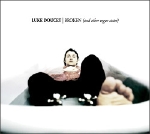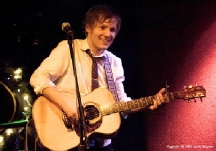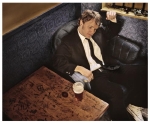|
|
|
Luke Doucet |
|
|
|
Luke Doucet has been a working musician since the age of 15. As such, Doucet has been a touring and session guitarist with a number of well-known musicians (Sarah McLachlan, Blue Rodeo, Chantal Kreviazuk), lead singer in his own neo-psych band (Veal), producer (Melissa McLelland, NQ Arbuckle) and is currently touring behind his newest album of original songs, Broken (and other rogue states). Way Cool Music sat down with the busy Doucet to discuss his career, his openess to learn from every relationship, and how he gets over a broken heart.
|
|
|
Way Cool: |
Tell me about your music background.
|
| |
|
Luke Doucet: |
My father was a jazz guitar player living in New Orleans and I had started taking guitar lessons when I was 13. At the same time, my dad moved back to Canada from New Orleans. A couple years later, I had a high school band that got some gigs in a bar and we needed an adult to be in the band. So, I asked my dad to join the band. My father and I played Blues together for three years every week; sometimes 12 -15 gigs a month. We played a lot. He taught me a lot and encouraged me to keep going with it. And 18 years later, here I am.
|
|
 |
|
|
|
WC: |
When did the songwriting start?
|
| |
|
| LD: |
I think my initial goal was just to be a guitar player because that seemed a lofty enough goal as it was. But, I always wrote songs. I didn’t take myself very seriously as a songwriter until quite a few years later. No, that’s entirely true…I wrote songs from the very beginning, and it was important. But, its easier to be a blue collar guitar player than it is to be a blue collar songwriter. I could get gigs, pay my rent and be a working musician as a guitar player so it forced my songwriting to the back burner until I made a concerted effort to pull it forward. That was just a couple years ago. But, my first priority was to be a guitar player. When I was a teenager, I was either gigging or practicing. I would practice from 5 to 8 hours a day, and I would have 10 to 15 gigs a month. It was all I did for years. It’s still all I do, except now I spend 10 hours a day driving my van…that’s the only difference.
|
| |
|
WC: |
How are people responding to your new record, Broken (and other rouge states), that you’ve described as a “break up” record? |
| |
|
LD: |

|
|
People hearing it are responding really favorably. They seem to really like it. That surprises me because the theme has been beaten to death. But, I guess if you are candid enough about your experience, and tell stories in a subjective way where you are describing specifics as opposed to generalities, you can make it still an interesting theme. Most people have gone through it, but everyone’s experience is unique. Broken hearts are like thumbprints. People seem willing to listen again and again and again as long as you are giving them something they haven’t heard before.
|
|
|
|
WC: |
Which of the songs do you get the most reaction from? |
|
|
LD: |
'Broken’ is the one people laugh at the most. But, it’s a bittersweet laughter. This is the first record I’ve ever made where there’s not one song that overwhelms the rest. People seem to respond in a balanced way to 7 or 8 songs…which is great. |
|
|
WC: |
You mentioned now you are over the break up, you would be writing some happy songs. How are those happy songs coming along? |
| |
|
| LD: |
Not so good. I’m still looking for the dark shit. I’ve been trying. What’s the last happy song that you really liked? They exist. Pop songs can be happy…real super production, shiny pop songs. But, even the pop songs I like aren’t happy. I’m half way up the ass of that problem right now. |
| |
|
| WC: |
It sounded like your concern was that happy songs were the only things that were gonna come out of you, and they were gonna be pathetic. |
| |
|
| LD: |
I was just as worried about being pathetic on the last record. It was just going to be a different kind of pathetic. It was self-pity, which is horrifying. But, I managed to avoid that. There’s happy music out there. It just doesn’t suit me. I don’t make Disco or instrumental porno funk…that’s happy music, but not really my bag. |
| |
|
WC: |
You are a songwriter, singer, guitarist and producer…what role do you enjoy the most? |
| |
|
| LD: |
The one I work hardest at because it’s the most important is being songwriter. The one I enjoy the most and gives the most satisfaction on a purely lifestyle basis is producing. The responsibility overwhelms me both because it’s difficult and because I’m so honored that somebody would give it to me. It means the world to me when somebody asks me to do that. I’m probably a better guitar player than any of the other things simply because I’ve been doing it the longest. But, I wish that weren’t the case. I wish I were a better producer or a better songwriter. The only area where I’m confident enough that I don’t have to think about it, and I can get swept away in the experience of it is playing the guitar. Everything else requires a certain amount of thought from me. Not that there aren’t challenges from a guitar perspective because there’s lots of guitar players out there that can play circles around my head. But, the way I enjoy playing is not difficult for me. The ways I can’t yet play are difficult, but I don’t necessarily care to get to that point. |
|

|
|
| |
|
WC: |
How do you choose your producing projects? |
|
|
LD: |
They chose me. In the last couple of years, I’ve turned a lot of projects down. Up until making my last record and Melissa’s (McClleland) last record, I was only getting offered one record a year. I would do it or not do it depending on how busy I was. I’ll work with people that I like and whose music inspires me…that’s all. If I were a career producer, I would take everything that came across my desk. I would have to in order to learn, and I’d need to work. As it is, I’m out here doing this most of the time so I’m turning down records I would love to produce. People come to me and ask, “Would you do this record?” I think, “Oh my God, do you know how fucking cool that would be?” But, the time may come when I readjust my priorities. It’s really nice to be asked.
I had a rock band called Veal and we did three albums. We had someone else produce those albums. So, I learned from some good people. And, I’ve been a studio musician for a long time. I’ve probably played on 35 records outside of my own as a guitar player so I got to watch a lot of producers work from a really close perspective in doing that. I’ve been around some great producers and got to listen to how they work, what they care about, and how they communicate with people. It was a great education. Every time I go in the studio in a capacity outside of “producer,” I learn a ton. I think you can learn from anybody. Listening to a 16 year-old with a garage band producing hip hop tracks on his laptop sitting on a commuter train…I could learn a ton from that kid. I don’t necessarily believe that the only ones whom have anything to teach you are the ones recognized as geniuses or legends. I think that everyone has something to offer. It just depends on how open you are to glean things off of them.
But, the production can effect the delivery of the story of the song as much as anything else. Given that, songwriters who find themselves in the role of producer on their own records are a bit territorial. You have to be careful not to be too territorial. If the point is to make the best record possible, you have to recognize when you are in over your head. If you have the opportunity to take it to the next level, you’d be a fool not to. Appeasing your ego is not a good enough reason to not take your music to the next level. And, even if ego were your only concern, taking your music to the next level is gonna be better for ego anyway. But, you have to be willing to relinquish the reins and I haven’t been so good at that. I’m going to make another record in 6 or 8 months, and I’m going to talk to a few different producers about making my record with me. But, they are people who are, arguably, beyond my reach. They are people I respect enormously. If they all say, “No,” I’m going to do it myself. It’s people like Mitchell Froom or Chad Blake or Mike Campbell from The Heartbreakers or T-Bone Burnett or Daniel Lanois. They might not be the perfect five people to cite as examples, but they make 50, 75, 100 or 200,000 dollars a record…and I’m not paying anybody that kind of money. Chances are I’ll be turned down, but we’ll ask.
|
|
|
WC: |
You’ve been on tour with some well-known artists such as Sarah McLachlan. What have you learned from people like Sarah? |
| |
|
| LD: |
Specifically from Sarah, I learned about poise and grace. She’s got those things in spades. She treats people really well. She’s a superstar and could be a fucking, massive diva, but she’s not. So, I have infinite admiration for her composure and the way she treats people. People have been in her band since long before she was successful. She could have easily hired session cats from L.A. and gone that route, but she hasn’t. She doesn’t sequester herself from her band which is rare for people of her stature. She really cares. She’s the band leader, but she’s part of the band which is really cool.
I also learned a lot from her about how you communicate with an audience. I learned about simplicity in songwriting. Some of her best work is some of the simplist stuff she’s written, and I got to watch that from the side of the stage. If I were in that position, I would do things a bit different. My version of the most successful I could be still involves having a really loose sound and a loose band. Crazy Horse plays arenas, and that version of how to entertain 10,000 people would be more fun for me. If I were ever fronting that, I would tell the band, “You are not to play the same song the same way twice.” Dylan mixes it up a lot. I like that. I know some people find that highly annoying. I suspect that Sarah’s audience would find that highly annoying. What’s beautiful about her music is the subtle indiosycroncities and lilts in her voice. She has such a magnificent instrument people want to hear that. They don’t want me fucking with a guitar which is what would happen if it were up to me. She’s right to not let that happen. But, if I’m ever in that place, there’s gonna be some chaos involved.
|
| |
|
| WC: |
You’ve been pretty forthright about the vices you’ve had and the ones you’ve given up. What’s your next vice? |
| |
|
| LD: |

|
|
Beer is the only have I have left. If I could find a drug that was as much fun as some of the Class A drugs I’ve mistakenly fallen into, but that only last 2 hours and is not addictive, I would do everything under the sun. But, most things that are that much fun, you pay a heavy toll so I’m not looking. Mind you, there are some healthy vices that I’m aware of like yoga, exercise and a vegetarian diet…those might be vices that are beneficial for me. Those are definitely on the short list. When I think vice, I think smokes. I’ve given the illusion that I have a hard living past. I’ve never woken up in the gutter. I’ve never found myself in jail. I don’t have a criminal record or have stuck needles in my arm. I don’t have a really shady past. But, I think about vices a lot. Whether my participation in them qualifies me as an “holic” of any kind, I doubt. But, that doesn’t change the fact that I think about them a lot. That just might part of being a musician. I’m having a beer right now…whatever. But, I do every day because I’m here everyday. So, it occasionally occurs to me, “Is this a problem.” And, you should be aware of it. Some people aren’t and they are probably better off for it. I think that one of the most damaging effects of a vice is the psychological damage it does to you. If you impose that psychology on yourself prematurely, you’re not helping. I’m more preoccupied with vices that they are with me.
|
|
| |
|
WC: |
Now itís time for seven questions. |
|
|
| |
|
|
|

|
|
|
What's the worst job you've ever had?
|
|
I was a barback at a heavy metal bar in Vancouver for about 6 months. I was working under the table because that’s how they hired everyone. They always tried to pay me in cocaine which, of course, I wouldn’t take. So, I don’t know if I ever actually got paid. |
| |
|
|
What's your favorite movie quote or song lyric?
|
|
My favorite lyric is Lyle Lovett’s “The mystery masked man was smart/he got himself a Tonto/The Tonto did the dirty work for free/The Tonto he was smarter/He said Kemosabe, ‘Why don’t you kiss my ass. I bought a boat and I’m going out to sea.”
My favorite quote from a movie is from The Last Waltz. It was when they were talking about why they were packing it in. Garth Hudson was saying “being on the road is a roll of the dice and at some point, your number comes up.” He was referring to the danger of being on the road in terms of plane crashes, car crashes, drug overdoses, unsavory ladies of the night…whatever happens to be on the down side of the road. That really resonated with me because in the last six months or so, I’ve been on the road constantly. I drive a lot and I don’t like that. Partly because I’m not convinced I’m a very good driver and I’m driving all over the states 8 to 10 hours a day. And, I’m an insomniac so I’m constantly tired.
|
| |
|
|
Who would you want to star in the movie of your life?
|
|
Dennis Hopper. |
| |
|
|
What's your favorite TV theme song?
|
|
Dallas (humming). I always wanted to do a surf guitar version of that. |
| |
|
|
If you were a superhero, what would your name be?
|
|
Luke. |
| |
|
|
What do you want to be when you grow up?
|
|
A grownup. |
| |
|
|
Finally, why are there so many songs about rainbows?
|
|
Because there’s gold at the end, that’s why. |
|
|
|
|
|
To find out more information about Luke Doucet, visit his website at www.lukedoucet.com. |
|
|
|
|
|
|